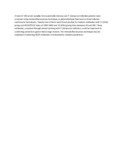| dc.contributor.author | Chemtai, AK | |
| dc.contributor.author | Perlmann, H | |
| dc.date.accessioned | 2015-04-08T07:11:22Z | |
| dc.date.available | 2015-04-08T07:11:22Z | |
| dc.date.issued | 1988 | |
| dc.identifier.citation | East African Medical Journal 1988 Vol. 65 No. 12 pp. 852-855 | en_US |
| dc.identifier.uri | http://www.cabdirect.org/abstracts/19910869286.html?resultNumber=3&q=au%3A%22Chemtai%2C+A.%22 | |
| dc.identifier.uri | http://hdl.handle.net/11295/81928 | |
| dc.description.abstract | A total of 100 serum samples from putatively immune and P. falciparum infected patients were screened using immunofluorescence technique on glutaraldehyde-fixed and air dried infected erythrocyte monolayers. Twenty-two of them were found positive for malaria antibodies with 12 (54%) giving anti-RESA/Pf155 titres of 1000-5000 and 10 (45%) giving titres between 40 and 200. These antibodies, acquired through natural priming with P. falciparum infection, could be important in conferring protection against blood stage malaria. The immunofluorescence technique may be employed in detecting RESA antibodies in holoendemic malaria populations. | en_US |
| dc.language.iso | en | en_US |
| dc.publisher | University of Nairobi | en_US |
| dc.title | Detection of anti-RESA/Pf 155 antibodies in Kenyan malaria immune individuals | en_US |
| dc.type | Article | en_US |
| dc.type.material | en | en_US |

